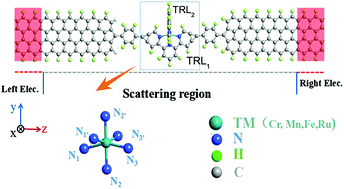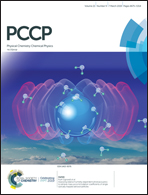Transition metal-containing molecular devices: controllable single-spin negative differential thermoelectric resistance effects under gate voltages†
Abstract
Based on the non-equilibrium Green function method combined with density functional theory, we investigate the spin-resolved transport through transition metal (TM) (= Cr, Mn, Fe and Ru)-containing molecular devices in the presence of zigzag graphene nanoribbon (ZGNR) electrodes. The wave-function mismatch for the single-spin component results in a perfect spin-filtering property near the Fermi level. Moreover, we also observe Fano and Breit–Wigner resonance peaks in the transmission spectrum. Under a temperature gradient, the single-spin electric current exhibits a remarkable negative differential thermoelectric resistance (NDTR) in the Ru-complex molecular device, which originates from the Fano asymmetry of the single-spin transmission peak near the Fermi level. A gate voltage allows for a precise control of the single-spin NDTR in the Ru-complex molecular device.



 Please wait while we load your content...
Please wait while we load your content...